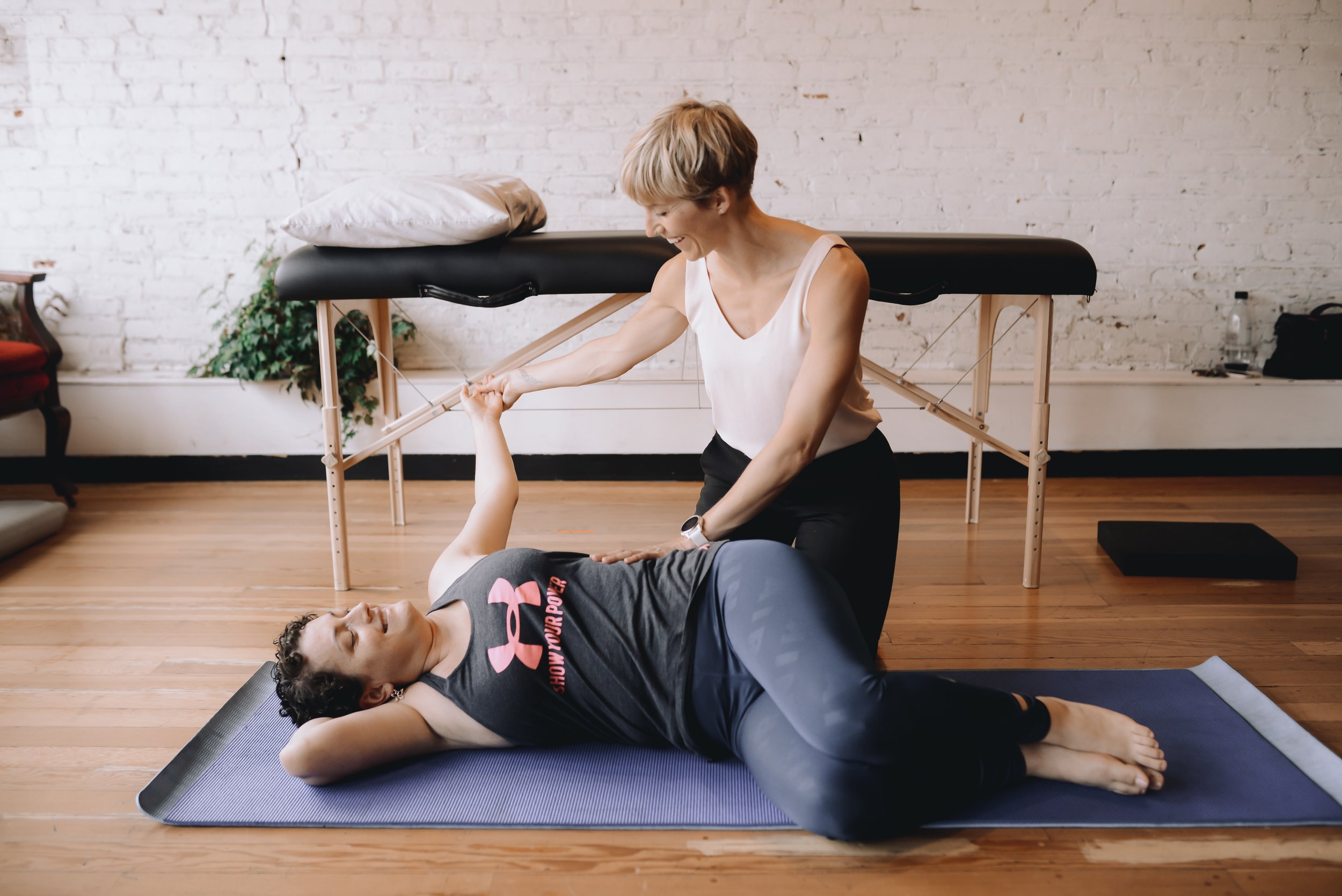
Breast Cancer Rehabilitation
Rehab Plans That Work
Breast cancer is one of the most commonly diagnosed and treated cancers in women, which can often lead to favourable outcomes. Understandably, the focus is often treatment. Little rehabilitation is provided to manage the side effects of treatment and the symptom burden can be heavy. The cancer physio promises not only advanced certifications in breast cancer rehabilitation but also evidence based clinical services by following the latest research.
5 REHAB PHASES
Breast cancer journeys fall into one of our 5 rehab phases, each benefiting from a personalized rehab plan with a chosen support level. Often the symptom burden be heavy and remain untreated; at times it can be hard to manage the set backs and returning to work or activity can feel overwhelming. Education is power, together we can find tools that help you feel better.
Conditions Treated
-
Pre-operative planning for all breast surgeries
Pre-hab planning prior to radiation, chemotherapy and hormone treatment
Post-operative rehab i.e: lumpectomy, mastectomy and reconstruction (TRAM, DIEP, IMPLANT etc.)
Post-mastectomy pain syndrome
Scar related adhesions and pain
Adhesive capsulitis/Frozen shoulder, stiff shoulder, weak shoulder, rotator cuff strain, rotator cuff impingement, scapular dyskinesia
arm/breast lymphedema
concerns about return to work/sport
-
Peripheral neuropathies of the arm/hands
chemotherapy induced peripheral neuropathies of the hands and feet,
long thoracic nerve palsy
shoulder, pec and hand weakness,
acute brachial neuropathy, neuralgic amyotrophy
monitoring of neuropraxia, dermatomal/myotomal health, and sensation
-
Chemotherapy induced vestibular neuropathy
(dizziness, unsteadiness, intolerance to head movements, vertigo etc.)
concerns about return to work/sport
-
symptoms related to chemotoxicity, neurotoxicity and cardiotoxicity
chemotherapy induced peripheral neuropathies of the hands, feet and/or vestibular system
cancer related fatigue
cachexia/muscle wasting and cancer related de-conditioning
concerns about return to work/sport
-
joint pain and joint stiffness (typically presenting in hands/feet and spine)
hot flashes, fatigue and sleep disturbances
concerns about return to work/sport
-
radiation fibrosis syndrome
radiated related pain, shoulder stiffness, scar adhesions or pain
axillary and thoracic chording
arm/breast lymphedema
concerns about return to work/sport
Patient Testimonials
"Nadine has been invaluable throughout my treatment for breast cancer and my recovery. Her expertise and support helped me through surgery, chemo, radiation, cancer-related fatigue and now we are working a gradual return to work plan. She is wonderfully kind and understanding and works from the heart. I am very glad to have her as my physio and as part of my health team!"
— Beth G., Cancer Physio Patient
Breast Cancer Services may Include:
60 min one:one cancer rehab initial assessment with a cancer physio
Baseline assessment: function, balance, range of motion, strength, aerobic and neurovascular systems
Vestibular assessment for dizziness, if needed.
Neuropathy assessment for sensation change, if needed,
Personalized rehab plan tailored to your rehab phase and 45-60 min cancer rehab follow ups according to your support level
Pool Therapy*
Manual therapy etc. (soft tissue/joint work, lymphatic techniques and IMS )*
Direct medical access to a cancer physio via email
Monthly e-newsletter “Empowered with Rehab”
Correspondence with oncologist, family physicians and insurance providers as needed, along with required medical reports*
Online rehab platform access (instructional videos, rehab plan and symptom tracking app).
*Offered in-clinic only, self-manual techniques provided via Telehealth
*Medical reports may have an extra fee
PREHAB PHASE
What Does Prehab Include?
The prehab phase starts after diagnosis prior to treatment; according to prehab research, a rehab plan has important impact here on shoulder function and limiting complications . Diagnostics are often included in this stage and can involve blood work (cancer markers, complete blood counts), tissue biopsies (lumpectomy or lymph node dissection) and/or detailed imaging.
Diagnostics allow your medical oncology team to obtain important information such as your cancer type, stage, grade and whether your tumour is estrogen, progesterone or HER 2 positive as hormone therapy may be needed. Furthermore a genetics assessment may be warranted to determine whether susceptibility genes such as BRCA 1 or 2 are involved. The above steps will allow your medical oncology team to prescribe your treatment pathway. Starting cancer rehab in the prehab phase offers preparedness, personalized medicine while lessening the chance of complications, and optimizing shoulder function for the long term.
TREATMENT PHASE
What Does the Treatment Phase Include?
The treatment phase is specific to the individual, it may start with a mastectomy or lumpectomy, for others it starts immediately with systemic chemotherapy. This phase is often paired with a symptom burden. Depending on the cancer type, stage, grade and cell cycle, a personalized treatment plan will be discussed with your medical oncology team. Treatment may include further surgery, radiation, chemotherapy and hormone therapy. Some medications may have a cardio-toxic effect, together we can discuss safe exercise following your ECG results. A personalized rehab plan according to your cancer stage, type and treatment stage can help promote joint health, cardiorespiratory health and energy conservation through out this difficult time.
Can a Rehab Plan help during Chemotherapy?
Systemic chemotherapies may cause NADIR (blood cell changes), cardio-toxicity, neuropathies and fatigue amongst other conditions. Targeted chemotherapies work more specifically on receptor blockers, enzyme inhibition or cell membrane infiltration but they too may cause symptoms such as mucosal irritation, gastritis, soft tissue inflammation and joint arthralgia. The most reported symptoms are chemotherapy induced fatigue, chemotherapy induced peripheral neuropathies, and nausea.
Despite this being a very difficult phase filled with fatigue, a personalized rehab plan can better health and provide you with tools that work. We also offer vestibular assessments for any concerns with dizziness or unsteadiness and neuropathy assessments for any concerns relating to sensory changes of the hands/feet.
Can a Rehab Plan help during Radiation?
Treatment planning may involve radiation. Mobility of the shoulder is very concerning during radiation and post, a rehab plan allows for tissue extensibility and healthy shoulder function. Post radiation, while in the proliferation phase of healing, rehab is very important to prevent the onset of radiation fibrosis syndrome. The risk continues to 2 months post radiation where rehabilitation continues to have a vital role. There are many tools that you can use to promote wound healing, diagnose any concerning neuropathies and optimize your outcomes through out this stage.
Can a Rehab Plan help during Hormone Therapy?
Hormone therapy may be part of your treatment pathway and leads to a very individualized symptom burden. As there is variation in how patients respond to these treatments, reading personal stories and worrying ahead of time may not be a good idea. The most reported symptoms from a survey of over 6000 cancer patients was fatigue, hot flashes and joint pain. Aim to understand the larger statistics and find preparedness.
Together we can work together to meet you where you are at. If needed, we can better manage fatigue, joint arthralgia, sleep hygiene and other symptoms that you may have. There are rehab tools available that work.
RECOVERY PHASE
When does Recovery Start?
The term ‘recovery’ is a bit fluid, often involving when a patient has completed a treatment regime (surgery, chemo and radiation); in addition to scans possibly indicating that the cancer has not metastasized. A patient may have started taking medications such as Tamoxifen, Anastrozole and other hormone therapies or started medications such as bio-phosphinates yet still be considered to be in ‘recovery’.
The term ‘recovery’ can be sensitive for some patients as the cancer journey continues in many ways. Recovery can still involve diagnostics, medications and a heavy symptom burden, which can make the term ‘recovery’ feel misleading.
Whatever symptom burden you hold, perhaps it’s some remaining shoulder stiffness, nerve pain, dizziness or fatigue with exertion, there are rehab supports available.
RETURN TO WORK PHASE
When Can I Return to Work?
Discussions around returning to work can be exciting but also overwhelming. Sometimes the focus on survivorship and treatment can mean that rehabilitation was put a side and once treatment is over, you may be left with unmanaged symptoms and feeling alone.
Returning to work may seem like a daunting task when you are feeling de-conditioned or left with complications from treatment. Together we can work with your insurance provider to create a manageable graded return to work providing the needed documentation and reports. Even without a heavy symptom burden, returning to work can involve a steep adjustment that is best suited with a gradual return.
Together we can advocate for a return to work that is right for you and duty schedule that you feel prepared for.
ACTIVE LIVING PHASE
How can I Start Rebuilding Strength or Return to Sport?
Completing treatment can feel exhausting. Often after some time spent in recovery, patients have the mental and physical energy to start finding themselves again. This can take the form of exploring active living, returning to sport, or setting a new physical goal.
At times there are some side effects and symptoms that aren’t in the forefront but upon exertion or with exercise can resurface. This can look like breathlessness, fatigue after exercise, increased joint pain or push/crash cycling.
Whether symptoms are limiting you or you are just wanting some clinical support and exercise programming to exercise safely, together we can get you back to the activities you love such as walking your dog, cross fit, cycling or paddle boarding.
Together we can perform a functional evaluation and baseline assessment, providing you with the rehab tools you need to feel safe getting back to the things you love.
Whatever phase you may be in and for however long, we welcome you as you are, offering cancer rehab driven by care of people and science.











